美国超验主义英语的介绍
美国超验主义英语介绍
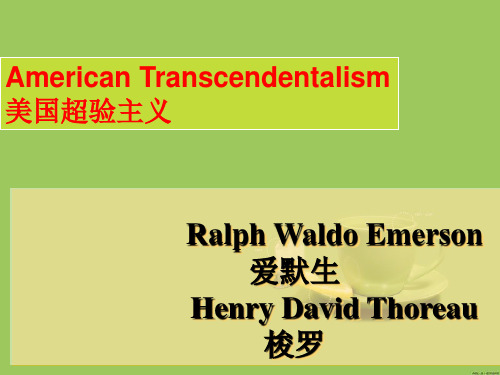
希望谨慎地生活,只 面对生活的基本事实, 看看我是否学得到生 活要教育我的东西,
and not, when I came to 免得到了临死的时候,
die, discover that I had
才发现我根本就没有
not lived.”
生活过。
பைடு நூலகம்
that evil was nonexistent appeared to be an optimistic folly
Sources
1.欧洲浪漫主义文学 【the romantic literature of Europe】
2.新柏拉图主义 【neo-Platonism】
3.德国理想主义哲学 【German idealistic philosophy】
2. the importance of the individual
3. nature is the symbol of Spirit or God
Creeds
• 1.至善 absolute good • 2.纯洁无暇 unspotted innocence of nature • 3.人具有神性 humanity was godlike and
“American Scholar”: American’s declaration of intellectual independence.( to develop American’s own culture)
Henry David Thoreau 1817-1862
He is best known for his book Walden, a reflection upon simple living in natural surroundings, and his essay, Civil Disobedience, an argument for individual resistance to civil government in moral opposition to an unjust state.
美国超验主义transendentalism解析

At school, Emerson read broadly;
After traveling in Europe and England, he came back and settled in Concord, Massachusetts where he took up the life of an essayist, poet and public speaker; Emerson’s great influence began when he delivered a course of lectures in Boston.
B. Main Woks Nature, the Bible of Transcendentalism; “The American Scholar”, regarded as “Declaration of Intellectual Independence”; “The Poet”; “Self-Reliance”; “Each and All”; “Rhodora”
Image: Grasmere Village, Hill Country, Great Britain
Brief Introduction Introduction Chapter 1 Nature Chapter 2 Commodity Chapter 3 Beauty Chapter 4 Language Chapter 5 Discipline
--- from the first paragraph of Chapter 1 “Nature”
Transcendentalism
Transcendentalism is literature, philosophical and literary movement that flourished in New England from about 1836 to 1860. It originated among a small group of intellectuals who were reacting against the orthodoxy of Calvinism and the rationalism of the Unitarian church, developing instead their own faith centering on the divinity of humanity and the natural world.
Emerson-Transcendentalism(常耀信,美国文学,超验主义.爱默生)
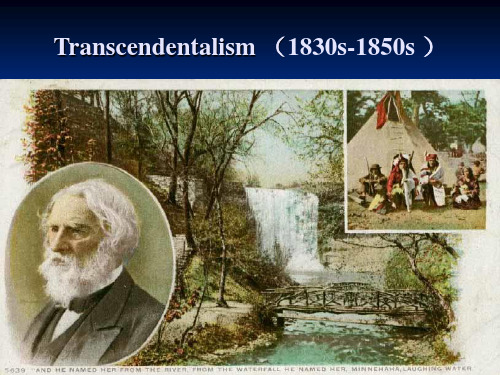
Features
②The Transcendentalists stressed the importance of individualism
• The individual soul communed with the Oversoul and was therefore divine. • The regeneration of society could only come about through the regeneration of the individual. • His perfection should be the first concern of his life. • The ideal type of man was the self-reliant individual
Resources
A. Puritan heritage P58 At the end of the 18th century people gradually felt boring about the strict Calvinism. At the same time with the development of science and technology, Americans suspected the old religion. Thus, Unitarianism(唯一理教) appeared. It was a developed school from the Transcendentalism. It stressed "continual progress of mankind" rather than old religion's "man's total depravity”.
美国文学史名词解释

American Puritanism 美国清教主义Simply speaking, American Puritanism just refers to the spirit and ideal of puritans who settled in the North American continent in the early part of the seventeenth century because of religious persecutions.美国清教主义指的是清教徒的精神和理想的定居在北美大陆十七世纪初期由于内容的宗教迫害。
It migration that laid the foundation for the religious, intellectual, and social order of New England. 它为新英格兰奠定了宗教,知识和社会秩序的基础。
Puritans adhered to the Five Points of Calvinism as codified at the Synod of Dort: unconditional election, limited atonement, total depravity, irresistible grace and the perseverance of the saints. 清教徒遵循加尔文派于多特宗教会议上制定的五点信条:无条件拣选,有限救赎,完全堕落,不可抗拒的恩典,以及圣徒的坚守。
It is basis of American literature. All literature is based on a myth – garden of Eden.It contributing to the development of Symbolism: a technique, widely used.它是美国文学的基础。
超验主义英语
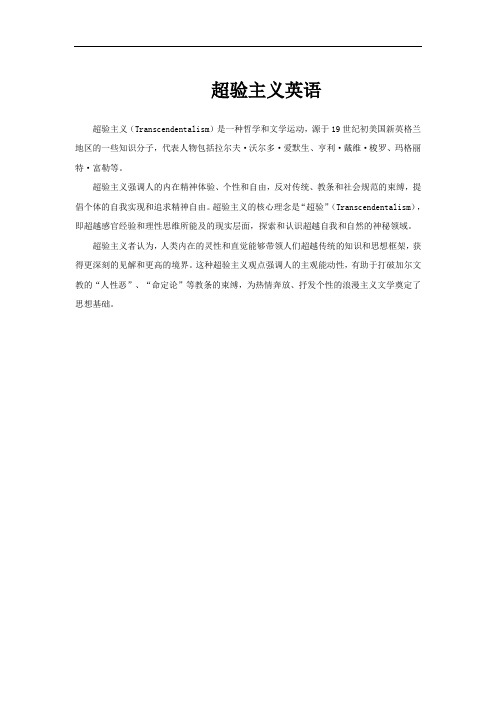
超验主义英语
超验主义(Transcendentalism)是一种哲学和文学运动,源于19世纪初美国新英格兰地区的一些知识分子,代表人物包括拉尔夫·沃尔多·爱默生、亨利·戴维·梭罗、玛格丽特·富勒等。
超验主义强调人的内在精神体验、个性和自由,反对传统、教条和社会规范的束缚,提倡个体的自我实现和追求精神自由。
超验主义的核心理念是“超验”(Transcendentalism),即超越感官经验和理性思维所能及的现实层面,探索和认识超越自我和自然的神秘领域。
超验主义者认为,人类内在的灵性和直觉能够带领人们超越传统的知识和思想框架,获得更深刻的见解和更高的境界。
这种超验主义观点强调人的主观能动性,有助于打破加尔文教的“人性恶”、“命定论”等教条的束缚,为热情奔放、抒发个性的浪漫主义文学奠定了思想基础。
Ralph-Waldo-Emerson-爱默生超验主义

• Whoso would be a man must be a nonconformist. (任何名副其实真正 的人,都必须是不落俗套的人。)
爱默生注重思想内容而没有过份注重词藻的华 丽,行文犹如格言,哲理深入浅出,说服力强, 且有典型的“爱默生风格”。有人这样评价他 的文字“爱默生似乎只写警句”,他的文字所 透出的气质难以形容:既充满专制式的不容置 疑,又具有开放式的民主精神;既有贵族式的 傲慢,更具有平民式的直接;既清晰易懂,又 常常夹杂着某种神秘主义……一个人能在一篇文 章中塞入那么多的警句实在是了不起的,那些 值得在清晨诵读的句子为什么总能够振奋人心, 岁月不是为他蒙上灰尘,而是映衬得他熠熠闪 光。
• Insist on yourself; never imitate. (坚持自己,决不要模仿 )
以“自立”为核心的爱默生式个人主义在美国个人主义思想的发展中具有承上启下 的作用。一方面,当时资本主义工业化和社会大生产已经开始在挤压和湮没个人。 爱默生在为个人进行呐喊。他的个人主义旨在通过提高人的灵魂和精神来战胜物质 主义和拜金主义。另一方面,美国民主制中的多数专制对个人的压迫也日渐明显, 提倡个人主义旨在保护个人的权利不受侵犯
Emerson’s Education
• 在1817年10月爱默生14岁时,他入读哈佛大 学并且被任命为新生代表,这个身份让他获得 免费住宿的机会。为了增添微薄的薪水,寒假 期间他会到Ripley 伯父在马萨诸塞州瓦胜市的 学校进行辅导及教学事务。在校期间,他阅读 了大量英国浪漫主义作家的作品,丰富了思想, 开阔了视野。
9 美国超验主义

Transcendentalism ( New being with God and nature)
Man and God and Nature
We cannot understand the America of the nineteenth century without coming to terms with Ralph Waldo Emerson
What do they believe?
I become a transparent eyeball;I am nothing;I see all; the currents of the Universal Being circulate through me. I am part or parcel of God. ---Emerson
•
---Henry D. Thoreau
American Transcendentalism
• 1. The first American intellectual movement to inspire a number of literary classics ( in Europe, it was a philosophy) • 2. It stresses the unity of being---viewing God, man and nature as sharers in a universal soul----Oversoul • 3. It is a kind of idealism and romanticism
Emerson
Thoreau
Fuller
B. Alcott
E. Peabody
Whoபைடு நூலகம்are they?
美国文学第5周超验主义

The Summit of American Romanticism
Transcendentalism
• (1) • (2) • (3) • (4)
Definition Features Influences Representatives
Emerson’s Point of View
“the infinitude of man” firmly believes in the transcendence of the “ oversoul ” regards nature as the purest, and the most sanctifying moral influence on man.
Ralph Waldo Emerson (1803----1882)
~~went to Europe, and met Coleridge, Carlyle and Wordsworth and made friends with them, and brought back the influence of European Romanticism.
2.regards nature as the purest, and the most sanctifying moral influence on man ~~Nature as symbolic of God. ~~In the eyes of Emerson, “nature is the vehicle of thought,” and “particular natural facts are symbols of particular spiritual facts”. Thus everything bears a secondary and an ulterior隐秘的 sense. A flowing river indicates the ceaseless motion of the universe. The seasons correspond to the life span of man. The ant is the image of man himself, small in body but mighty in heart.
超验主义
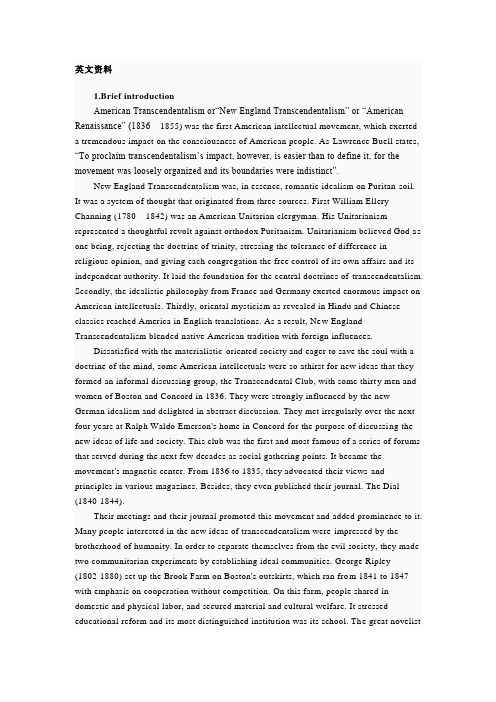
英文资料1.Brief introductionAmerican Transcendentalism or“New England Transcendentalism” or “American Renaissance” (1836---1855) was the first American intellectual movement, which exerted a tremendous impact on the consciousness of American people. As Lawrence Buell states, “To proclaim transcendentalism’s impact, however, is easier than to define it, for the movement was loosely organized and its boundaries were indistinct”.New England Transcendentalism was, in essence, romantic idealism on Puritan soil. It was a system of thought that originated from three sources. First William Ellery Channing (1780---1842) was an American Unitarian clergyman. His Unitarianism represented a thoughtful revolt against orthodox Puritanism. Unitarianism believed God a s one being, rejecting the doctrine of trinity, stressing the tolerance of difference in religious opinion, and giving each congregation the free control of its own affairs and its independent authority. It laid the foundation for the central doctrines of transcendentalism. Secondly, the idealistic philosophy from France and Germany exerted enormous impact on American intellectuals. Thirdly, oriental mysticism as revealed in Hindu and Chinese classics reached America in English translations. As a result, New England Transcendentalism blended native American tradition with foreign influences.Dissatisfied with the materialistic-oriented society and eager to save the soul with a doctrine of the mind, some American intellectuals were so athirst for new ideas that they formed an informal discussing group, the Transcendental Club, with some thirt y men and women of Boston and Concord in 1836. They were strongly influenced by the new German idealism and delighted in abstract discussion. They met irregularly over the next four years at Ralph Waldo Emerson's home in Concord for the purpose of discussi ng the new ideas of life and society. This club was the first and most famous of a series of forums that served during the next few decades as social gathering points. It became the movement's magnetic center. From 1836 to 1835, they advocated their views and principles in various magazines. Besides, they even published their journal. The Dial (1840-1844).Their meetings and their journal promoted this movement and added prominence to it. Many people interested in the new ideas of transcendentalism were impressed by the brotherhood of humanity. In order to separate themselves from the evil society, they made two communitarian experiments by establishing ideal communities. George Ripley (1802-1880) set up the Brook Farm on Boston's outskirts, which ran from 1841 to 1847 with emphasis on cooperation without competition. On this farm, people shared in domestic and physical labor, and secured material and cultural welfare. It stressed educational reform and its most distinguished institution was its school. The great novelistNathaniel Hawthorne (1806-1864) was once its member. It is a pity that a disastrous fire in the uninsured main building put and end to this experiment. The second experiment is Fruitlands, near Harvard, set up by Bronson Alcott (1799-1888) in 1843. On this farm, Alcott stressed the absolute avoidance of exploitation of man and beast. It lasted less than a year because it was more extreme in practice than the Brook Farm. Alcott also helped to organize and preside over the concord School of Philosophy (1879-1888), a summer seminar. This was the last significant activity of transcendentalism. However, in the 1830s and 1840s,transcendentalism was treated in newspapers and magazines as something between a national laughing stock and a clear menace to organized religion2. Major ConceptsThe term “transcendentalism” is derived from the Latin verb transcendere meaning, to rise above, or to pass beyond the limits. Transcendentalism has been defined as the recognition in man of the capacity of acquiring knowledge transcending the reach of the five senses, or of knowing truth intuitively, or of reaching the divine without the need of an intercessor. As the leader of this movement, Ralph Waldo Emerson interpreted transcendentalism as “whatever belongs to the class of intuitive thought,” and as “idealism as it appears in 1842.” He believed that the transcendental law was the “moral law” through which man discovered the nature of God as a living spirit. The major concepts that accompanied transcendentalism can be summarized in the following six points.(1) It stressed the power of intuition, believing that people could learn things both from the outside world by means of the five senses and from the inner world by intuition. But the things they learned from within were truer than the things they learned from without, and transcended them. It held that everyone had access to a source of knowledge that transcended the everyday experiences of sensation and reflection. Intuition was inner light within.(2) As romantic idealism, it placed spirit first and matter second. It believed that both spirit and matter were real but that the reality of spirit was greater than that of matter. Spirit transcended matter, and the permanent reality was the spiritual one. It stressed essence behind appearance.(3) It took nature as symbolic of spirit of God. All things in nature were symbols of the spiritual, of God’s presence. Nature was alive, filled with God’s overwhelming presence. Everything in the universe was viewed as an expression of the divine spirit. Behind physical objects was a universal soul. Nature was God’s enlightenment towards human beings. Therefore, it could exercise a healthy and restorative influence on human mind. Nature was ennobling and people were somehow better for being out in the wo ods or meadows. So people should come close to nature for instructions. Nature not only showed humanity its own materiality but taught human morality. Nature’s beauty was thebeauty of human mind. The two were joined together. With this organic view in min d, it stressed unity of humanity and nature.(4) It emphasized the significance of the individual and believed that the individual was the most important element in society and that the ideal kind of individual wasself-reliant and unselfish. It held that there was a greatness in all human beings that needed only to be set free. People should depend on themselves for spiritual perfection. As the individual soul could commune with God, it was, therefore, divine. With the assumption of the innate goodness of humanity, it held that the individual soul could reach God without the help of churches or clergy. While stressing individuality, it rejected the restraints of tradition and custom. The transcendentalist had an uncompromising concern for individual’s mo ral development rather than for social progress. The dignity of the individual remains a vital part of American creed even today.(5) Emerson envisioned religion as an emotional communication between an individual soul and the universal “Oversoul”. The “Oversoul” as called by Emerson was an all-pervading unitary spiritual power of goodness, omnipresent and omnipotent, from which all things came and of which everyone was a part. It existed in nature and in humanity alike and constituted the chief element of the universe. Generally, the Oversoul referred to spirit of God as the most important thing in the universe. Since the Oversoul was a single essence, and since all people derived their beings from the same source, the seeming diversity and clash of human interests was only superficial, and all people were in reality striving toward the same ends by different but converging paths. Thus was affirmed the universal brotherhood of humanity, and the ultimate resolution of all social problems. The harder each person strove to express his or her individuality, the more faithfully he or she followed the inner voice, the more surely would the aims of his or her life coincide with those of his or her neighbor.(6) It held that commerce was degrading and that a life spent in business was a wasted life. Humanity could be much better off if people paid less attention to the material world in which they lived.3. SignificanceTherefore, transcendentalism can be best understood as a somewhat late and localized manifestation of romantic movement in literature and philosophy. The triumph of intuition over five senses, the exaltation of the individual over society, the critical attitude toward formalized religion, the rejection of any kind of restraint or bondage to custom, the new and thrilling delight in nature --- all these were in some measure characteristic of transcendentalism. These ideas also inspired English poets Wordsworth and Coleridge as well as many German idealist philosophers. As formulated by Emerson, transcendentalism became a clarion call to action, exhorting young people to cast off their deadening enslavement to the past, to follow God within, and to live every moment of life withstrenuousness, to regard nature as the great objective lesson proving God’s presence everywhere in His creation.Transcendentalism was also an ethical guide to life for a young nation of America. It preached the positive life and appealed to the best side of human nature. Therefore, it stressed the tolerance of difference in religious opinion and the free control o f his own affairs by each congregation, and called to throw off shackles of custom and tradition, and to go forward to the development of a new and distinctly American culture. It insisted on the essential worth and dignity of the individual as a powerful force for democracy. It also advocated, and practiced, an idealism that was greatly needed in a rapidly expanded economy where opportunity too often became mere opportunism, and the desire to “get on” obscured the moral necessity for rising to spiritual he ight.New England Transcendentalism is important to American literature at least for two reasons. On the one hand, it is represented by two major writers of the country----Emerson and Thoreau. They became movers and shakers whose writings have had more and more impact with the passage of time. So far as these two writers are concerned, they were more enduringly important for their ideology than for their actual literary achievement. On the other hand, a new group of writers under the influence of Emerson and Thoreau began to apply transcendental ideas in their works. Almost all the writers of the period were more or less influenced by transcendentalist doctrines. Hawthorne, Melville, Lowell, Dickinson, and Whitman were all exponents of transcendentalism in one way or another. They created one of the most prolific periods in the history of American literature.4. WeaknessesThe transcendentalist movement had a small membership and only lasted for a few years, but it has exerted great impact in the country. As time passes, the term “Transcendentalism” has lost its derogatory sense and become the condensation of American romantic movement in literature of the period. It lasting importance is great. Transcendentalism, however, was never a systematic philosophy. It borrowed from many sources and reconciled few of them. Whenever the demand of logic became too insistent, it turned to mysticism. It became a rationale for the pressure toward expansionism that was already turning people’s minds to the conquest of the West. It resulted far more often in rampant individualism than in a democracy of mutual helpfulness and equal opportunity. The denial of the reality of evil tended to make moral indignation an irrelevant emotion. The failure of transcendentalism as a moral force in American life was its denial of its real spiritual origin. People used it to justify their acquisitiveness and left it up to the principle of compensation to balance the rest of the account. These are its weaknesses.Spider-Man is a fictional Marvel Comics superhero. The character was created by writer-editor Stan Lee and writer-artist Steve Ditko. He first appeared in Amazing Fantasy #15 (Aug. 1962). Lee and Ditko conceived of the character as an orphan being raised by his Aunt May and Uncle Ben, and as a teenager, having to deal with the normal struggles of adolescence in addition to those of a costumed crime fighter. Spider-Man's creators gave him super strength andagility, the ability to cling to most surfaces, shoot spider-webs using devices of his own invention which he called "web-shooters", and react to danger quickly with his "spider-sense", enabling him to combat his foes.with great power ,comes great responsibilitySpider-Man is one of the most popular and commercially successful superheroesCommon Traits:◆Extraordinary powers, skills and/or equipment. Superhero powers vary widely;superhuman strength, the ability to fly, enhanced senses, and the projection of energybolts are all common. Others have special weapons or technology, such as Iron Man'spowered armor suits and Green Lantern’s power ring. Many characters supplementtheir natural powers with a special weapon or device (e.g., Wonder Woman's lasso andbracelets, Spider-Man's webbing, Wolverine's adamantium claws, Daredevil's billy club,or Thor's hammer).◆ A strong moral code, including a willingness to risk one's own safety in the service ofgood without expectation of reward. Such a code often includes a refusal or strongreluctance to kill or wield lethal weapons.◆ A secret identity that protects the superhero's friends and family from becoming targetsof his or her enemies, such as Clark Kent (Superman), although many superheroeshave a confidant (usually a friend or relative who has been sworn to secrecy). As onescholarly work analyzed in 1972,◆ A distinctive costume, often used to conceal the secret identity (see Common costumefeatures).◆An underlying motif or theme that affects the hero's name, costume, personal effects,and other aspects of his or her character (e.g., Batman resembles a large bat, operates atnight, calls his specialized automobile, which also appears bat-like, the "Batmobile"and uses several devices given a "bat" prefix, Spider-Man can shoot webs from hishands, has a spider web pattern on his costume, and other spider-like abilities).◆ A supporting cast of recurring characters, including the hero's friends, co-workersand/or love interests, who may or may not know of the superhero's secret identity.Often the hero's personal relationships are complicated by this dual life, a commontheme in Spider-Man and Batman stories in particular.◆ A number of enemies that he/she fights repeatedly. In some cases superheroes begin byfighting run of the mill criminals before supervillains surface in their respective storylines. In many cases the hero is in part responsible for the appearance of these supervillains (the Scorpion was created as the perfect enemy to defeat Spider-Man, andcharacters in Batman's comics often accuse him of creating the villains he fights).Often superheroes have an archenemy who is more troubling than the others. Often anemesis is a superhero's doppelganger or foil (e.g., Sabretooth embraces his savageinstincts while Wolverine tries to control his; Batman is dark, quiet, and grim, while theJoker is colorful, loquacious, and flamboyant).◆Independent wealth (e.g., Batman or the X-Men's benefactor Professor X) or anoccupation that allows for minimal supervision (e.g., Superman's civilian job as areporter).◆ A headquarters or base of operations, usually kept hidden from the general public (e.g.,Superman's Fortress of Solitude or Batman's Batcave).◆ A backstory that explains the circumstances by which the character acquired his or herabilities as well as his or her motivation for becoming a superhero. Many origin storiesinvolve tragic elements and/or freak accidents that result in the development of thehero's abilities.◆ A weakness or Achilles' heel, whether concrete and external, such as Kryptonite in thecase of Superman; or psychological and internal, such as anger and biochemistry in thecase of the The Incredible Hulk.What's a superhero?Superheroes, or using a much politically-correct term costumed crime-fighters, are fictional characters that fight bad guys in the public's interest. Superheroes usually have super-powers, but they can replace these with skills, gadgets and abilities. Superheroes primarily belong incomic-books, although they can also be found in regular literature, film, and other forms of creative arts.Superheroes generally possess:∙Superpowers, abilities, skills or equipment that allows them to stand out from regular people. For example, Superman has super strength, speed, flying capabilities, and more,while Iron Man has a multifunctional power armor.∙ A "driving force" that causes them to pursue the acts of superheroism. For example, Batman has a personal vendetta against bad guys, while Spiderman has an overdeveloped sense of responsibility.∙ A cool, flashy costume.∙ A secret identity to allow them to live a separate, relatively normal life, including a profession and relationships. For example, Superman is Clark Kent while Spiderman isPeter Parker.∙Bad guys to fight, and usually a personal nemesis. Batman has his Joker while Professor x has Magneto.∙Good guys in support roles and love interests. Lois Lane, Alfred Pennyworth and Mary-Jane Watson are prime examples.Superhero world 1- DC ComicsDC is the original world of comics. The DC Universe is home to many of the most well-known heroes you can think of. A few include:∙Superman, the original, prototypical superhero. Coming to Earth as a baby alien,Superman discovered his powers as a teenager and eventually sprang to battle theevil-doers of the world using powers that range from flight and super strength to x-rayvision and ice breath. When he's not battling Lex Luthor and other crazy bad guys,Superman spends his life as Clark Kent, working as a journalist and flirting with LoisLane. If you're looking for a classic superhero, Superman is the one and only.∙Batman. The Dark Knight is indeed dark, using nothing but the skills and gadgets of Bruce Wayne to fight the evil doers and avenge his parents, who were murdered beforehis eyes as a kid. Batman comics are generally regarded as darker and more complex than Superman ones, featuring psychotic and scary villains like the Joker and Two-Face aswell as support staff like a rotating cast of Robins and Bat-Girls.∙Wonder Woman, or Princess Diana, is an Amazonian who utilizes superpowers as great as Superman's as well as some cool equipment like a magic laso and bracelets. WonderWoman is the original superheroine, but she's definitely as tough as the male versions,battling various criminals and villains (as well as villainesses).∙Others: The various Green Lanterns and Flashes are popular DC characters, as are characters like the Martian Manhunter and Green Arrow. The DC Universe also features the Justice League, a team encompassing most superheroes to fight big threats.Superhero World 2- MarvelThe main competitor of DC, Marvel Universe proclaims rich and interesting characters that are extremely popular. Some of these include:∙Spider Man. Peter Parker was bit by a radioactive spider and with great power came great responsibility. He became Spider Man, a young hero dealing with growing up whilefighting crime at the same time. With a rich support cast and complex villains, SpiderMan has always been one of the most popular comic books, ever.∙The X-Men, a group of superheroic mutants that includes popular characters as Wolverine, Cyclopes, Storm and Ice Man. Fighting crime while protecting themselvesfrom prosecution by mutant-haters, the X-Men revolved around real world themes ofdiscrimination and racism while providing characters that are both interesting and cool.∙The Fantastic Four, the original family of superheroes. The relationships between Mr.Fantastic, Invisible Woman, Human Torch and the Thing is realistic and amusing, butthese guys also like to fight crazy criminals like Dr. Doom, all while maintaining a public image of self-sacrificing heroes for the good of the public.。
美国超验主义

Themes of Walden
• It emphasizes the importance of selfreliance, solitude, contemplation, and closeness to nature in transcenidng the “desperate” existence.
Transcendentalism
Introduction
• Transcendentalism is a philosophical movement that developed in the 1830s and 1840s in the New England region of the United stated as a protest to the general state of culture and society. Among the transcendentalists' core beliefs was the inherent goodness of both man and nature. Transcendentalists believed that society and its institutions - particularly organized religion and political parties - ultimately corrupted the purity of the individual. They had faith that man is at his best when truly "self -reliant" and independent. It is only from such real individuals that true community could be formed.
美国超验主义分析

Thoreau's masterpiece,Walden, is great Transcendentalist work that came out of the period under discussion. As a young man Thoreau took a more than usual interest in the natural world.Like Emerson, but more than him, he saw nature as a genuine restorative, healthy influence on man's spiritual wellbeing, and regarded it as a symbol of the spirt. He tried to seek a way to unlock the secrets of the spirit.梭罗的
The Transcendentalism placed emphasis on spirit,or the Oversoul, as the most important thing in the universe.超验主 义认为精神或“超灵”是宇宙中最重要之物。
The Transcendentalism stress the importance of the individual.超验主义者注重个人。 The Transcendentalism offered a fresh perception of nature as symbolic of the Spirit or God.超验主义认为自然是超灵或 者上帝的象PSUM
美国文学 超验主义

Important terms (1)
Although transcendentalism was never a rigorously systematic philosophy, it had some basic tenets that were generally shared by its adherents. The beliefs that God is immanent in each person and in nature(每人都有内在的神性) and that individual intuition is the highest source of knowledge led to an optimistic emphasis on individualism, self-reliance, and rejection of traditional authority.
Important features of New England Transcendentalism (2)
It was also a reaction against the process of dehumanization (磨灭人性)that came in the wake of developing capitalism. The industrialization of New England was turning men into nonhumans. People were losing their individuality and were becoming uniform. The Transcendentalists saw the process in progress and, by trying to reassert the importance of the individual, emphasized the significance of men regaining their lost personality.
美国超验主义(AmericanTranscendentalism)

美国超验主义(American Transcendentalism)是美国的一个重要思潮,它兴起于十九世纪三十年代的新英格兰地区,但波及其他地方,成为美国思想史上一次重要的思想解放运动。
它是与拉尔夫·沃尔多·爱默生以及梭罗相关的一种文学和哲学运动,宣称存在一种理想的精神实体,超越于经验和科学之处,通过直觉得以把握。
超验主义是美国文学的第三个阶段,真正开始影响美国的文学风格。
超验主义的主要思想观点有三。
首先,超验主义者强调精神,或超灵,认为这是宇宙至为重要的存在因素。
超灵是一种无所不容、无所不在、扬善抑恶的力量,是万物之本、万物之所属,它存在于人和自然界内。
其二,超验主义者强调个人的重要性。
他们认为个人是社会的最重要的组成部分,社会的革新只能通过个人的修养和完善才能实现。
因此人的首要责任就是自我完善,而不是刻意追求金玉富贵。
理想的人是依靠自己的人。
其三,超验主义者以全新的目光看待自然,认为自然界是超灵或上帝的象征。
在他们看来,自然界不只是物质而已。
它有生命,上帝的精神充溢其中,它是超灵的外衣。
因此,它对人的思想具有一种健康的滋补作用。
超验主义主张回归自然,接受它的影响,以在精神上成为完人。
这种观点的自然内涵是,自然界万物具象征意义,外部世界是精神世界的体现。
2019大三下美国文学term
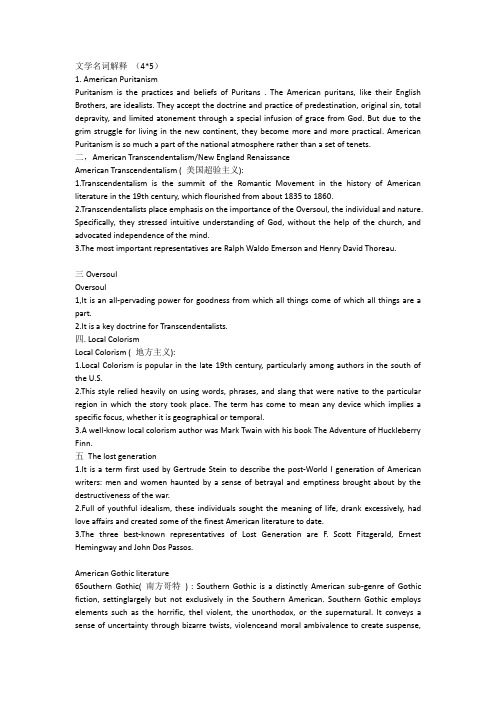
文学名词解释(4*5)1. American PuritanismPuritanism is the practices and beliefs of Puritans . The American puritans, like their English Brothers, are idealists. They accept the doctrine and practice of predestination, original sin, total depravity, and limited atonement through a special infusion of grace from God. But due to the grim struggle for living in the new continent, they become more and more practical. American Puritanism is so much a part of the national atmosphere rather than a set of tenets.二,American Transcendentalism/New England RenaissanceAmerican Transcendentalism ( 美国超验主义):1.Transcendentalism is the summit of the Romantic Movement in the history of American literature in the 19th century, which flourished from about 1835 to 1860.2.Transcendentalists place emphasis on the importance of the Oversoul, the individual and nature. Specifically, they stressed intuitive understanding of God, without the help of the church, and advocated independence of the mind.3.The most important representatives are Ralph Waldo Emerson and Henry David Thoreau.三OversoulOversoul1,It is an all-pervading power for goodness from which all things come of which all things are a part.2.It is a key doctrine for Transcendentalists.四. Local ColorismLocal Colorism ( 地方主义):1.Local Colorism is popular in the late 19th century, particularly among authors in the south of the U.S.2.This style relied heavily on using words, phrases, and slang that were native to the particular region in which the story took place. The term has come to mean any device which implies a specific focus, whether it is geographical or temporal.3.A well-know local colorism author was Mark Twain with his book The Adventure of Huckleberry Finn.五The lost generation1.It is a term first used by Gertrude Stein to describe the post-World I generation of American writers: men and women haunted by a sense of betrayal and emptiness brought about by the destructiveness of the war.2.Full of youthful idealism, these individuals sought the meaning of life, drank excessively, had love affairs and created some of the finest American literature to date.3.The three best-known representatives of Lost Generation are F. Scott Fitzgerald, Ernest Hemingway and John Dos Passos.American Gothic literature6Southern Gothic( 南方哥特) : Southern Gothic is a distinctly American sub-genre of Gothic fiction, settinglargely but not exclusively in the Southern American. Southern Gothic employs elements such as the horrific, theI violent, the unorthodox, or the supernatural. It conveys a sense of uncertainty through bizarre twists, violenceand moral ambivalence to create suspense,while it was also used to explore the social, political, and racial is-sues of America.7. Symbolism ( 象征意义): Symbolism is the writing technique of using symbols. It's a literary movement that arose in France in the last half of the 19th century and that greatly influenced many English writers , particularly poets inthe 20th century. It enables poets to compress a very complex idea or set of ideas into one image or even one word.It's one of the most powerful devices that poets employ in creation.8. Stream of Consciousness NovelStream of consciousness(意识流):It is one of the modern literary techniques. It is the style of writing that attempt s to imitate the natural flow of a character’s thoughts, feelings, reflections, memories, and mental images as the character experiences them. It was first used in 1922 by the Irish novelist James Joyce. Those novels broke through the bounds of time and space, and depicted vividly and skillfully the unconscious activity of the mind fast changing and flowing incessantly。
lecture 5 超验主义
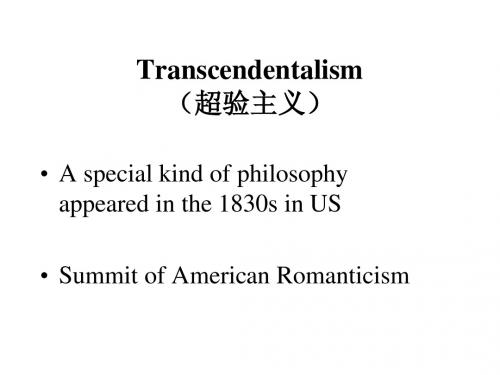
Life
A. born in a clergyman’s family in New England B. graduated from Harvard C. founded a Transcendentalists' Club and published a journal D. traveled and gave lectures; quite influential
Resources
• A. Puritan heritage At the eቤተ መጻሕፍቲ ባይዱd of the 18th century people gradually felt boring about the strict Calvinism. At the same time with the development of science and technology, Americans suspected the old religion. Thus, Unitarianism(唯一神教) appeared. It stressed ―continual progress of mankind‖. • Emerson once was a preacher of Unitarianism, but he thought there were too many rituals. Then he resigned from the position. Emerson also believed in individuality. He inherited the ideas of inward communication with God and the divine symbolism of nature.
• A foolish consistancy is the hobgoblin of little minds… • With consistancy a great soul has simply nothing to do.
Ralph Emerson

of authors based in Concord, Massachusetts, and was led by Ralph Waldo Emerson, like romanticism, transcendentalism rejected both 18th-century rationalism and established religion,
Emerson‟s diary(1)
Diary of May 24, 1847
The days come and go like muffled and veiled figures sent from a distant friendly party, but they say nothing, and if we do not use the gifts they bring, they carry them as silently awayBecomes the poem „Days‟, which is one of his best:
---Ralph
Waldo Emerson
Nature
Introduction:
In the “Introduction”, Emerson pronounces the fundamental premise about Nature in Transcendentalism, that is, Nature is not simply the Not-Me but also the universal mind whose signs, or symbols, are visible for the individual to read, with eyes, heart and mind. The „Introduction” is followed by eight sections, each of which develops a general thesis: “Nature”; “Commodity”; “Beauty”; “Language”; “Discipline”; “Idealism”; “Spirit” and “Prospects”.
超验主义论文
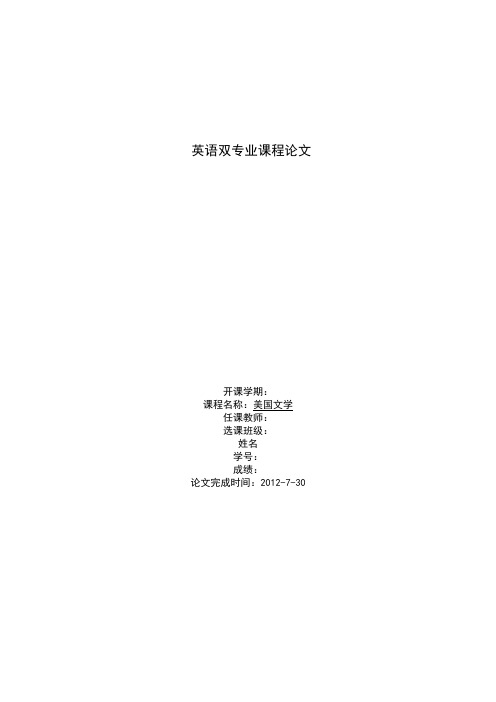
英语双专业课程论文开课学期:课程名称:美国文学任课教师:选课班级:姓名学号:成绩:论文完成时间:2012-7-30A brief introduction to American Transcendentalism Abstract:美国超验主义也叫“新英格兰超验主义”或者说“美国文艺复兴”是美国的一种文学和哲学运动。
与拉尔夫·沃尔多·爱默生和玛格丽特·富勒有关,它宣称存在一种理想的精神实体,超越于经验和科学之处,通过直觉得以把握。
领导人是美国思想家、诗人拉尔夫·沃尔多·爱默生。
美国超验主义(American transcendentalism)是美国的一个重要思潮,它兴起于十九世纪三十年代的新英格兰地区,但波及其他地方,成为美国思想史上一次重要的思想解放运动。
它是与拉尔夫·沃尔多·爱默生以及梭罗相关的一种文学和哲学运动,宣称存在一种理想的精神实体,超越于经验和科学之处,通过直觉得以把握。
本文从超验主义的定义,起源,主要观点,意义等方面论述。
Key word:美国超验主义精神爱默生理想主义Brief Introduction:Transcendentalism is a philosophical movement that developed in the 1830s and 1840s in the New England region of the United States as a protest to the general state of culture and society, and in particular, the state of intellectualism at Harvard University and the doctrine of the Unitarian church taught at Harvard Divinity School. Among the transcendentalists' core beliefs was the inherent goodness of both man and nature. Transcendentalists believed that society and its institutions - particularly organized religion and political parties - ultimately corrupted the purity of the individual. They had faith that man is at his best when truly "self-reliant" and independent. It is only from such real individuals that true community could be formed.1.DefinitionsLawrence Buell, New England Literary Culture (1986)"Transcendentalism, in fact, really began as a religious movement, an attempt to substitute a Romanticized version of the mystical ideal that humankind is capable of direct experience of the holy for the Unitarian rationalist view that the truths of religion are arrived at by a process of empirical study and by rational inference from historical and natural evidence" (46).William Henry Channing(1810-1844)"Transcendentalism, as viewed by its disciples, was a pilgrimage from the idolatrous world of creeds and rituals to the temple of the Living God in the soul. It was a putting to silence of tradition and formulas, that the Sacred Oracle might be heard through intuitions of the single-eyed and pure-hearted. Amidst materialists, zealots, and skeptics, the Transcendentalist believed in perpetual inspiration, the miraculous power of will, and a birthright to universal good. He sought to hold communion face to face with the unnameable Spirit of his spirit, and gave himself up to the embrace of nature's perfect joy, as a babe seeks the breast of a mother."Charles Mayo Ellis, An Essay on Transcendentalism (1842)"That belief we term Transcendentalism which maintains that man has ideas, that come not through the five senses or the powers of reasoning; but are either the result of direct revelation from God, his immediate inspiration, or his immanent presence in the spiritual world. . . ."2.SourceReaction against New England Calvinism∙Reaction against eighteenth-century rationalismo God as Deistic "divine watchmaker"o skepticism∙Reaction against Lockean empiricism∙Emerging ideal of American democracy∙German philosophyo idealism (principle of organicism--Leibniz)o Kant and Neoplatonists (mind imposes form). Transcendentalism affirmed Kant'sprinciple of intuitive knowledge not derived from the senses. According to M. H.Abrams in A Glossary of Literary Terms, "Kant had confined the expression'transcendental knowledge' to the cognizance of those forms and categories--such asspace, time, quantity, causality-which, in his view, are imposed on perception by theconstitution of all human minds; he regarded these aspects as the universal conditionsof sense-experience. Emerson and others, however, extended the concept oftranscendental knowledge, in a way whose validity Kant had specifically denied, toinclude an intuitive cognizance of moral and other truths that transcend the limits ofhuman sense-experience" (216).o Schelling (emphasis on feeling; divinity and creative impulse in nature) ∙The Romantic movement, especially Coleridge, Wordsworth, and the English romantics (Emerson)∙Unitarianism∙Eastern philosophyEmanuel Swedenborg3.Major ConceptsThe term ―transcendentalism‖ is derived from the Latin verb transcendere meaning, to rise above, or to pass beyond the limits. Transcendentalism has been defined as the recognition in man of the capacity of acquiring knowledge transcending the reach of the five senses, or of knowing truth intuitively, or of reaching the divine without the need of an intercessor. As the leader of this movement, Ralph Waldo Emerson interpreted transcendentalism as ―whatever belongs to the class of intuitive thought,‖ and as ―idealism as it appears in 1842.‖ He believed that the transcendental law was the ―moral law‖ thro ugh which man discovered the nature of God as a living spirit. The major concepts that accompanied transcendentalism can be summarized in the following six points.(1)It stressed the power of intuition, believing that people could learn things both from the outside world by means of the five senses and from the inner world by intuition. But the things they learned from within were truer than the things they learned from without, and transcended them. It held that everyone had access to a source of knowledge that transcended the everyday experiences of sensation and reflection. Intuition was inner light within.(2)As romantic idealism, it placed spirit first and matter second. It believed that both spirit and matter were real but that the reality of spirit was greater than that of matter. Spirit transcended matter, and the permanent reality was the spiritual one. It stressed essence behind appearance. (3)It took nature as symbolic of spirit of God. All things in nature were symbols of the spiritual, of God’s presence. Nature was alive, filled with God’s overwhelming presence. Everything in the universe was viewed as an expression of the divine spirit. Behind physical objects was a universalsoul. Nature was God’s enlightenment towards human beings. Therefore, it cou ld exercise a healthy and restorative influence on human mind. Nature was ennobling and people were somehow better for being out in the woods or meadows. So people should come close to nature for instructions. Nature not only showed humanity its own materiality but taught human morality. Nature’s beauty was the beauty of human mind. The two were joined together. With this organic view in mind, it stressed unity of humanity and nature.(4)It emphasized the significance of the individual and believed that the individual was the most important element in society and that the ideal kind of individual was self-reliant and unselfish. It held that there was a greatness in all human beings that needed only to be set free. People should depend on themselves for spiritual perfection. As the individual soul could commune with God, it was, therefore, divine. With the assumption of the innate goodness of humanity, it held that the individual soul could reach God without the help of churches or clergy. While stressing individuality, it rejected the restraints of tradition and custom. The transcendentalist had an uncompromising concern for individual’s moral development rather than for social progress. The dignity of the individual remains a vital part of American creed even today.(5)Emerson envisioned religion as an emotional communication between an individual soul and the universal ―Oversoul‖. The ―Oversoul‖ as called by Emerson was an all-pervading unitary spiritual power of goodness, omnipresent and omnipotent, from which all things came and of which everyone was a part. It existed in nature and in humanity alike and constituted the chief element of the universe. Generally, the Oversoul referred to spirit of God as the most important thing in the universe. Since the Oversoul was a single essence, and since all people derived their beings from the same source, the seeming diversity and clash of human interests was only superficial, and all people were in reality striving toward the same ends by different but converging paths. Thus was affirmed the universal brotherhood of humanity, and the ultimate resolution of all social problems. The harder each person strove to express his or her individuality, the more faithfully he or she followed the inner voice, the more surely would the aims of his or her life coincide with those of his or her neighbor.(6)It held that commerce was degrading and that a life spent in business was a wasted life. Humanity could be much better off if people paid less attention to the material world in which they lived.4.Ideals (of Emerson's philosophy)Transcendentalism posits a distinction between "Understanding," or the normal means of apprehending truth through the senses, and "Reason," a higher, more intuitive form of perception. In Biographia Literaria, Coleridge cites Milton's Paradise Lost on the difference between reason and understanding (Book V, ll. 479-490). In this passage from Paradise Lost, Raphael instructs Adam and Eve on the distinction between heavenly and earthly perception: So from the rootSprings lighter the green stalk, from thence the leavesMore aery, last the bright consummate flow'rSpirits odorous breathes: flowr's and thir fruitMan's nourishment, by gradual scale sublim'dTo vital spirits aspire, to animal,To intellectual, give both life and senseFancy and understanding, whence the SoulReason receives, and reason is her being,Discursive, or intuitive; discourseIs oftest yours, the latter most is oursDiffering but in degree, of kind the same.According to Emerson, reason is "the highest faculty of the soul--what we mean by the soul itself; it never reasons, never proves, it simply perceives; it is vision." By contrast, "The Understanding toils all the time, compares, contrives, adds, argues, near sighed but strong-sighted, dwelling in the present the expedient the customary" (L1:412-413).Microcosm and macrocosm: each part of nature contains all within it. "Nature is a sea of forms radically alike. . . ." ; "Every particular in nature, a leaf, a drop, a crystal, a moment of time is related to the whole, and partakes of the perfection of the whole. Each particle is a microcosm, and faithfully renders the likeness of the world."Principle of analogy, of perceiving correspondences: "[M]an is an analogist, and studies relations in all objects."Emblematic Nature: "Every natural fact is a symbol of some spiritual fact."Universal soul ("Oversoul"): "Meantime within man is the soul of the whole; the wise silence;the universal beauty, to which every part and particle is equally related."The principle of organicism; the concept of the circle.Transcendentalism, like other romantic movements, proposes that the essential nature of human beings is good and that, left in a state of nature, human beings would seek the good.Society is to blame for the corruption that mankind endures. Hawthorne's juxtaposition of the red rose, the flower of nature, and the rusty, blackened prison, the "black flower" of society, exemplifies this perspective. This view opposes the neoclassical vision that society alone is responsible for keeping human beings from giving in to their own brutish natures.Transcendentalism also takes the Romantic view of man's steady degeneration from childhood to adulthood as he is corrupted by culture: "A man is a god in ruins."Perfectionism and optimism.See also the Romantic concept of the sublime,especially the ideas of Edmund Burke.5.SignificanceTherefore, transcendentalism can be best understood as a somewhat late and localized manifestation of romantic movement in literature and philosophy. The triumph of intuition over five senses, the exaltation of the individual over society, the critical attitude toward formalized religion, the rejection of any kind of restraint or bondage to custom, the new and thrilling delight in nature --- all these were in some measure characteristic of transcendentalism. These ideas also inspired English poets Wordsworth and Coleridge as well as many German idealist philosophers. As formulated by Emerson, transcendentalism became a clarion call to action, exhorting young people to cast off their deadening enslavement to the past, to follow God within, and to live every moment of life with strenuousness, to regard nature as the great objective lesson proving God’s presence everywhere in His creation.Transcendentalism was also an ethical guide to life for a young nation of America. It preached the positive life and appealed to the best side of human nature. Therefore, it stressed the tolerance of difference in religious opinion and the free control of his own affairs by each congregation, and called to throw off shackles of custom and tradition, and to go forward to the development of anew and distinctly American culture. It insisted on the essential worth and dignity of the individual as a powerful force for democracy. It also advocated, and practiced, an idealism that was greatly needed in a rapidly expanded economy where opportunity too often became mere opportunism, and the desire to ―get on‖ obscured the moral necessity for rising to spiritual height.New England Transcendentalism is important to American literature at least for two reasons. On the one hand, it is represented by two major writers of the country----Emerson and Thoreau. They became movers and shakers whose writings have had more and more impact with the passage of time. So far as these two writers are concerned, they were more enduringly important for their ideology than for their actual literary achievement. On the other hand, a new group of writers under the influence of Emerson and Thoreau began to apply transcendental ideas in their works. Almost all the writers of the period were more or less influenced by transcendentalist doctrines. Hawthorne, Melville, Lowell, Dickinson, and Whitman were all exponents of transcendentalism in one way or another. They created one of the most prolific periods in the history of American literature.6.ConclusionAmerican transcendentalism was an important movement in philosophy and literature that flourished during the early to middle years of the nineteenth century (about 1836-1860). It began as a reform movement in the Unitarian church, extending the views of William Ellery Channing on an indwelling God and the significance of intuitive thought. It was based on "a monism holding to the unity of the world and God, and the immanence of God in the world" (Oxford Companion to American Literature770). For the transcendentalists, the soul of each individual is identical with the soul of the world and contains what the world contains.Its weakness:The transcendentalist movement had a small membership and only lasted for a few years, but it has exerted great impact in the country. As time passes, the term ―Transcendentalism‖ has lost its derogatory sense and become the condensation of American romantic movement in literature of the period. It lasting importance is great. Transcendentalism, however, was never a systematic philosophy. It borrowed from many sources and reconciled few of them. Whenever the demand of logic became too insistent, it turned to mysticism. It became a rationale for the pressure toward expansionism that was already turning people’s minds to the conquest of the West. It resulted far more often in rampant individualism than in a democracy of mutual helpfulness and equal opportunity. The denial of the reality of evil tended to make moral indignation an irrelevant emotion. The failure of transcendentalism as a moral force in American life was its denial of its real spiritual origin. People used it to justify their acquisitiveness and left it up to the principle of compensation to balance the rest of the account.Bibliography1.Charles Mayo Ellis, An Essay on Transcendentalism (1842)2.Cooke, George Willis. Unitarianism in America; a History of its Origin and Development. Boston, 1902.3.Ellis, George E. A Half–Century of the Unitarian Controversy. Boston, 1857.4.Frothingham, Octavius Brooks. Boston Unitarianism, 1820–1850; the Life and Work of Nathaniel Langdon Frothingham. 1890.——Transcendentalism in New England, a History. 1876.wrence Buell, New England Literary Culture (1986)6.M. H. Abrams in A Glossary of Literary Terms,7.Walker, Willston. A History of the Congregational Churches in the United States. 1804.8.Winsor, Justin [ed.] The Memorial History of Boston. [V ol. III.] Boston, 1881. [The Unitarians in Boston, by Peabody, A.P.]。
- 1、下载文档前请自行甄别文档内容的完整性,平台不提供额外的编辑、内容补充、找答案等附加服务。
- 2、"仅部分预览"的文档,不可在线预览部分如存在完整性等问题,可反馈申请退款(可完整预览的文档不适用该条件!)。
- 3、如文档侵犯您的权益,请联系客服反馈,我们会尽快为您处理(人工客服工作时间:9:00-18:30)。
Mottos
• ''The world shrank itself into a drop of dew.'' 世界将其自身缩小成为一滴露水
"Believe yourself"
"A person must be able to become what he wants to be "
The major features of Transcendentalists
4.东方神秘主义 【Oriental mysticism】
Weaknesses
The transcendentalist movement had a smafor a few years.
The transcendentalism was never a systematic philosophy. It borrowed from many sources.
“American Scholar”: American’s declaration of intellectual independence.( to develop American’s own culture)
Henry David Thoreau 1817-1862
He is best known for his book Walden, a reflection upon simple living in natural surroundings, and his essay, Civil Disobedience, an argument for individual resistance to civil government in moral opposition to an unjust state.
2. the importance of the individual
3. nature is the symbol of Spirit or God
Creeds
• 1.至善 absolute good • 2.纯洁无暇 unspotted innocence of nature • 3.人具有神性 humanity was godlike and
The failure of transcendentalism as a moral force in American life was its denial of its real spiritual origin.
爱默生 Ralph Waldo Emerson
梭罗 Henry David Thoreau
a prescient(有先见之明的) critic of the countervailing(对抗性的) pressures of society.
Emerson's work
Nature. It is the Bible of transcendentalists. It contains almost everything Emerson wants to say in the rest of his life. His later works were mostly to illustrate the book.
that evil was nonexistent appeared to be an optimistic folly
Sources
1.欧洲浪漫主义文学 【the romantic literature of Europe】
2.新柏拉图主义 【neo-Platonism】
3.德国理想主义哲学 【German idealistic philosophy】
American Transcendentalism 美国超验主义
Ralph Waldo Emerson 爱默生
Henry David Thoreau 梭罗
Historical background
• A broad, philosophical movement in New England during the Romantic era(peak:1836-1855) the first American intellectual movement.
Ralph Waldo Emerson
Ralph Waldo Emerson (1803-1882)
philosopher, lecturer, essayist, and poet,
leading the Transcendentalist movement
a champion(拥护者) of individualism
1. emphasis on Spirit or the Oversoul
---Oversoul is a unitary(统一的) power of goodness, omnipresent(无所不在的) and omnipotent(无所不能的), from which all things came and of which everyone was a part。
• Started by a group of people in the Transcendental Club in the 1830s who published their views in the journal The Dial
Brief Introduction
Transcendentalist believed instinct or intuition is the deepest level of man’s soul. They tried to find truth through feeling, rather than through logic. So they write not in a logical way. We can say they formed a movement of feelings & beliefs rather than a system of philosophy.
